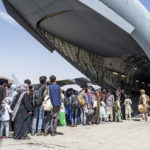Since the February 2021 military coup in Myanmar, about 1 million people—most of them members of religious and ethnic minorities—have been internally displaced, in addition to those seeking refuge in neighboring countries, a recent report revealed.
Continued violence by the Burmese military—known as the Tatmadaw—also has resulted in about 2,500 noncombatant deaths, according to a policy update on Burma from the U.S. Commission on International Religious Freedom.
As of September, the military junta’s State Administrative Council directly has overseen the arrest of 14,000 citizens, torched more than 19,000 homes, internally displaced 700,000 people, and forced 60,000 refugees to flee to neighboring India and Thailand, the commission reported.

Those arrested include Hkalam Samson, past president and general secretary of the Kachin Baptist Convention in Myanmar, who was detained earlier this month by the Burmese military and continues to be held in an undisclosed location in Kachin State.
“The unjust arrest of Dr. Samson, his detention in an unknown location, and the denial of his rights as a citizen both prior to his arrest and since his arrest jeopardize his life and are of grave concern,” Baptist World Alliance General Secretary Elijah Brown and Asia Pacific Baptist Federation General Secretary Vesekhoyi Tetseo wrote in a Dec. 8 letter.
“At a time when faith leaders can play an indispensable role in building just and lasting peace, far too many individuals continue to be imprisoned and communities of faith targeted and destroyed.”
Conditions deteriorate for Rohingya
Conditions for the country’s Rohingya Muslims—already targeted for at least a decade prior to the coup by the nation’s Buddhist majority—continued to deteriorate since the Tatmadaw seized control of the government, the U.S. Commission for International Religious Freedom report stated.
About 950,000 registered Rohingya refugees from Myanmar live in Bangladesh, where their freedom of movement is limited, hampering their ability to find legal employment.
After the commission sent a delegation to visit Rohingya refugees in the region last month, it called on the U.S. government to work with Bagladeshi authorities to support the Rohingya community and also engage with international organizations to provide for refugees.
Sign up for our weekly edition and get all our headlines in your inbox on Thursdays
The commission report also called on the U.S. to “prioritize religious freedom, including justice for Rohingya and voluntary repatriation, as core criteria for recognition of any pro-democracy opposition group within Burma.”
In Myanmar, the report noted, “ongoing clashes between the SAC, ethnic armies and pro-democracy forces have sparked new fears of another Rohingya exodus.”
In March, U.S. Secretary of State Anthony Blinken announced atrocities committed by the Burmese military against the Rohingya constituted “crimes against humanity and genocide.”
Christians suffer ‘violence and discrimination’
However, the Rohingya are not the only victims of systematic persecution by the Burmese military.
“Since the 2021 coup, Burma’s various Christian communities have suffered violence and discrimination in a magnitude that some have compared to what the Rohingya community has historically faced,” the commission report stated.
The United Nations High Commissioner for Refugees documented an increase in more than 33,000 internally displaced individuals in Chin State and 4,100 in Kachin State, both areas where Christians constitute a majority. The U.N. documented 76,000 in Kayah State, where Christians are a significant minority.
Civil groups estimate the number of internally displaced people in Kayah State could be as many as 170,000, the report noted.
“Many Christian and other communities have fled to neighboring countries, including over 40,000 to Mizoram, India,” the report stated.
A commission delegation met last month with Christian refugees in Malaysia “who reported on dire conditions for their compatriots still within Burma,” the report continued.

“They also reported that their forced flight from Burma, which was in part a result of their religious identity, has deprived them of other rights—such as access to education and employment—due to an absence of laws in Malaysia that provide these rights for refugees and asylum seekers.
“Houses of worship remain particularly vulnerable targets of SAC violence within Burma as the military has bombed, mined and burned Catholic, Baptist and other Christian churches.”
Early last month, the Tatmadaw shelled the Kachin Bible School in northern Myanmar.
At its July meeting in Birmingham, Ala., the Baptist World Alliance general council approved a resolution condemning the coup in Myanmar and the Burmese military for waging “a campaign of terror and violence, particularly against minority religions.”















We seek to connect God’s story and God’s people around the world. To learn more about God’s story, click here.
Send comments and feedback to Eric Black, our editor. For comments to be published, please specify “letter to the editor.” Maximum length for publication is 300 words.